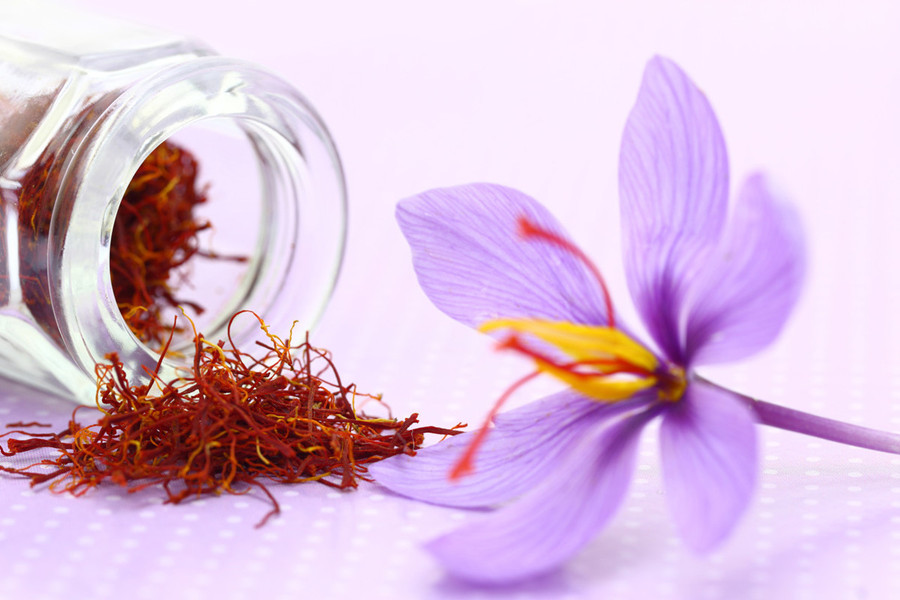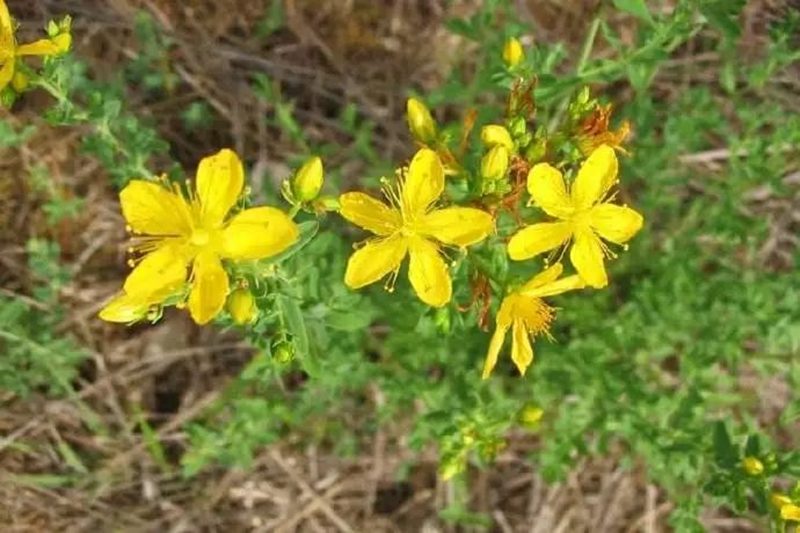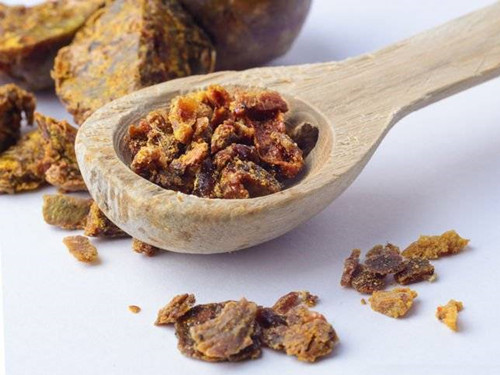Depression, once considered the preserve of a few elites and literary geniuses, has become “popular.” According to statistics, more than 350 million people worldwide suffer from depression. The pathogenic factors of depression are varied and complicated, often induced by physiological, psychological and environmental factors, and easy to relapse. At present, the main treatment for depression is drug therapy, psychotherapy, and physical therapy, among which, the more common is antidepressant drugs, but most drugs have side effects and will produce a certain resistance. Therefore, compared with traditional antidepressants, most patients are more inclined to choose natural, safe and less side effects of plant extracts or herbs for relief. Here we take a look at some of the herbs you can use to relieve depression.
Crocus sativus
Crocus sativus L. is a perennial bulb herb flower of the genus Crocus in the iris family, also known as saffron or Crocus. Saffron is widely used in Spain, France and other European countries as an essential food spice, but also an extremely precious medicine in China. In recent years, studies have found that saffron extract has strong antioxidant activity, which can not only significantly improve anxiety and sleep, but also regulate the brain’s storage and reproduction of information, alleviating memory deficits.
Recently, researchers from Australia’s Murdoch University and other institutions published a study in the British Journal of Neuropharmacology found that saffron extract and antidepressant drugs combined use also has a better antidepressant effect. In this randomized, double-blind, placebo-controlled trial, 160 depressed patients between the ages of 18 and 65 were divided into two groups and given an antidepressant medication, with one group receiving an additional saffron extract (capsule) and the other an additional placebo for eight weeks.
The results showed that patients who took the saffron extract capsules experienced a 41 percent reduction in depressive symptoms and those who took the placebo group experienced a 21 percent reduction in depressive symptoms. In addition, patients taking saffron extract capsules also performed better in terms of sleep quality and active participation in various activities. These results suggest that “saffron can be used as a supplement to enhance the effectiveness of antidepressant therapy.” In addition, the results suggest that saffron supplementation may reduce some of the side effects of antidepressants.” However, the researchers also said that the findings are preliminary, and more research is needed to confirm the efficacy of saffron in antidepressants.
Rhodiola rosea
Rhodiola rosea L. is the dried root and rhizome of Rhodiola Rosea, also known as golden root. More than two thousand years ago, people on the Tibetan Plateau used it as medicine to strengthen their health and resist the influence of the adverse environment. Modern studies have shown that Rhodiola rosea has antioxidant, increase exercise endurance, and improve immunity, improve sleep and whitening effects. In addition, animal studies have shown that rhodiola extract salidroside can increase the speed of serotonin precursor tryptophan and 5-HTP in the brain, and may improve depression and depression.
On March 15, 2015, an associate professor at the Perelman School of Medicine at the University of Pennsylvania and his colleagues published a study in the American journal of Botanical Medicine that found that rhodiola extract can treat depression and minimize side effects. The study recruited a total of 57 adults with depressive disorder (who had at least two major depressive episodes, low mood, or a loss of interest or enjoyment in life activities) who were randomly assigned to receive standard rhodiola extract, an antidepressant, and a placebo for 12 weeks.
The study found that participants treated with rhodiola rosea extract and antidepressants had a 1.4-fold and 1.9-fold increase in depressive symptoms, respectively, compared with placebo. Although there was a slight improvement in depressive symptoms in patients treated with antidepressants, side effects (mainly nausea and sexual dysfunction) were twice as likely in those treated with the extract. The findings suggest that patients who are intolerant to antidepressants may try to receive rhodiola rosea extract with minimal side effects instead.
Hypericum perforatum
Hypericum perforatum L., also known as St. John’s wort, is a perennial herb of the genus Hypericum in the garcinia family. Modern scientific research has proved that hypericin and St. John’s wort resin in hypericum perforatum have anti-depressant, anti-viral, anti-tumor, anti-inflammatory and immune-boosting properties. With the continuous development of scientific research, Hypericum perforatum extract has also been proven in the treatment of mild and moderate depression and anxiety.
A 2016 study involving 14 studies of 960 adults showed that daily intake of 500 to 1,800 mg of hypericum perforatum extract can significantly reduce depression, as well as standard prescription antidepressants. The study found that Hypericum perforatum extract improves mood, anxiety symptoms, and antidepressant effects by reducing the body’s reabsorption of serotonin, dopamine, and norepinephrine.
Mexican-clover
The Mexican-clover (Richardia scabra L.) is a species of alfalfa in the rubiaceae family. In traditional Chinese medicine treatment, the whole plant of Mexican-clover is used as a tonic and emetics, and studies have also found that it has certain medicinal activity in the treatment of asthma and dermatitis. On December 30, 2016, an animal experimental study evaluating the neuropharmacological activity of alfalfa extract found that alfalfa Mexican-clover extract has significant antidepressant and antianxiety activity.
In this animal study, it was found that medicago mexicano-clover extract has very significant anti-depression and anti-anxiety activities. At the same time, different doses of alfalfa extract showed anti-anxiety and anti-depression activities. These findings suggest that Mexican-clover extract may contain central nervous system inhibitors, which may be a future source of natural compounds for antidepressants and anti-anxiety drugs. However, the exact bioactive compounds in Mexican-clover extract still need to be clarified by further studies, and the basic mechanism of action needs to be fully elucidated.
Broccoli
Broccoli, a cruciferous plant, is a popular vegetable. Among all vegetables, broccoli is the first among similar vegetables in terms of nutrients, and has the reputation of “vegetable crown”. Regular consumption is beneficial to health. On August 14, 2016, a study published by the Social Mental Health Education Research Center of Chiba University in Japan showed that sulforaphane (SFN) from broccoli has the effect of preventing depression and inhibiting the recurrence of depression.
The team studied mice and found that those in a depressed state showed less interest in sweets. So, the researchers used the sweet water experiment to measure mice, and found that normal healthy mice could drink the concentration of 70% to 80% of the sweet water, while stressed depressed mice could only drink about 50% of the sweet water. But if SFN was fed to the mice before they fell into a depressive state, the depressed mice drank the sweet water just as well as normal mice, thus avoiding the onset of depressive symptoms. The results show that sulforaphane has the effect of preventing depression. At the same time, the research team believes that the results of this animal study are likely to be effective in humans, and hopes that in the future, balanced intake of cruciferous vegetables such as broccoli can reduce the risk of depression.
With the increase in the prevalence of depression and the high probability of recurrence, the prevention and treatment of depression is particularly important. Therefore, natural, safe and effective antidepressant drugs have broad prospects for development. With the continuous deepening of research, natural plant extracts may have a place in anti-depression fields.
- Dandelion Extract: What It Is, Benefits, Uses and Side Effect - April 23, 2024
- Is Berberine Extract Help For Weight Loss? - April 11, 2024
- Why Is Pysllium Husk Powder A Popular Meal Replacement Ingredient? - April 3, 2024





